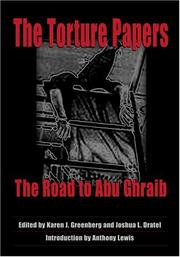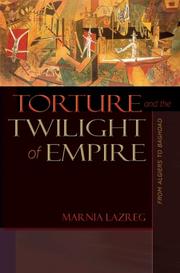| Listing 1 - 5 of 5 |
Sort by
|
Book
ISBN: 9780521767538 9781107401488 9780511581052 Year: 2009 Volume: *6 Publisher: Cambridge Cambridge University
Abstract | Keywords | Export | Availability | Bookmark
 Loading...
Loading...Choose an application
- Reference Manager
- EndNote
- RefWorks (Direct export to RefWorks)
Human rights --- United States --- Middle East --- Abu Ghraib Prison --- War on Terrorism, 2001-2009 --- Law and legislation --- Terrorism --- Basic rights --- Civil rights (International law) --- Rights, Human --- Rights of man --- Human security --- Transitional justice --- Truth commissions --- Prevention --- Abu Ghraib Prison. --- Baghdad Central Confinement Facility --- BCCF --- Muʻtaqal Abū Gharīb --- Sijn Abū Gharīb --- Muʻtaqal Abū Ghurayb --- Muʻtaqal Abū Ghurayyib --- معتقل ابو غريب --- سجن أبو غريب

ISBN: 1316086321 0511298854 0511511124 0511109644 9786610416387 1280416386 0511197551 0511181116 0511109954 9780511109959 9780511109645 0521853249 9780521853248 9780511511127 6610416389 0521853222 9780521853224 0521853230 9780521853231 9781316086322 9780511298851 9781280416385 9780511197550 9780511181115 Year: 2005 Publisher: New York Cambridge University Press
Abstract | Keywords | Export | Availability | Bookmark
 Loading...
Loading...Choose an application
- Reference Manager
- EndNote
- RefWorks (Direct export to RefWorks)
The Torture Papers document the so-called 'torture memos' and reports which US government officials wrote to prepare the way for, and to document, coercive interrogation and torture in Afghanistan, Guantanamo, and Abu Ghraib. These documents present for the first time a compilation of materials that prior to publication have existed only piecemeal in the public domain. The Bush Administration, concerned about the legality of harsh interrogation techniques, understood the need to establish a legally viable argument to justify such procedures. The memos and reports document the systematic attempt of the US Government to prepare the way for torture techniques and coercive interrogation practices, forbidden under international law, with the express intent of evading legal punishment in the aftermath of any discovery of these practices and policies.
Iraq War, 2003-2011 --- Torture --- Political prisoners --- Prisoners of conscience --- Prisoners --- Prisoners and prisons, American. --- Atrocities. --- Abu Ghraib Prison. --- Baghdad Central Confinement Facility --- BCCF --- Muʻtaqal Abū Gharīb --- Sijn Abū Gharīb --- Muʻtaqal Abū Ghurayb --- Muʻtaqal Abū Ghurayyib --- معتقل ابو غريب --- سجن أبو غريب --- Law --- General and Others
Book
ISBN: 0511698534 1107194482 1282302744 9786612302749 051158041X 051158105X 0511580738 0511579160 0511578423 051157990X 9780511580734 9780511581052 9780521767538 0521767539 9780521767538 9781107401488 1107401488 9780511698538 9781107194489 9781282302747 6612302747 9780511579165 9780511578427 Year: 2009 Publisher: Cambridge [UK] New York Cambridge University Press
Abstract | Keywords | Export | Availability | Bookmark
 Loading...
Loading...Choose an application
- Reference Manager
- EndNote
- RefWorks (Direct export to RefWorks)
This book traverses three pivotal human rights struggles of the post-September 11th era: the American human rights campaign to challenge the Bush administration's 'War on Terror' torture and detention policies, Middle Eastern efforts to challenge American human rights practices (reversing the traditional West to East flow of human rights mobilizations and discourses) and Middle Eastern attempts to challenge their own leaders' human rights violations in light of American interventions. This book presents snapshots of human rights being appropriated, promoted, claimed, reclaimed and contested within and between the American and Middle Eastern contexts. The inquiry has three facets: first, it explores intersections between human rights norms and power as they unfold in the era. Second, it lays out the layers of the era's American and Middle Eastern encounter on the human rights plane. Finally, it draws out the era's key lessons for moving the human rights project forward.
Human rights --- Terrorism --- Basic rights --- Civil rights (International law) --- Rights, Human --- Rights of man --- Human security --- Transitional justice --- Truth commissions --- Prevention --- Law and legislation --- Abu Ghraib Prison. --- Baghdad Central Confinement Facility --- BCCF --- Muʻtaqal Abū Gharīb --- Sijn Abū Gharīb --- Muʻtaqal Abū Ghurayb --- Muʻtaqal Abū Ghurayyib --- معتقل ابو غريب --- سجن أبو غريب --- Law --- General and Others
Book
ISBN: 1409429695 1315581892 1317136667 1317136659 9786613479884 1283479885 1409429709 1409495213 Year: 2012 Publisher: Abingdon, UK : Routledge,
Abstract | Keywords | Export | Availability | Bookmark
 Loading...
Loading...Choose an application
- Reference Manager
- EndNote
- RefWorks (Direct export to RefWorks)
Fallgirls provides an analysis of the abuses that took place at Abu Ghraib in terms of social theory, gender and power, based on first-hand participant-observations of the courts-martials of Lynndie England and Sabrina Harman. This book examines the trials themselves, including interactions with soldiers and defense teams, documents pertaining to the courts-martials, US government reports and photographs from Abu Ghraib, in order to challenge the view that the abuses were carried out at the hands of a few rogue soldiers. With a keen focus on gender and sexuality as prominent aspects of the abuses themselves, as well as the ways in which they were portrayed and tried, Fallgirls engages with modern feminist thought and contemporary social theory in order to analyse the manner in which the abuses were framed, whilst also exploring the various lived realities of Abu Ghraib by both prisoners and soldiers alike.
Women in war. --- Control (Psychology) --- Women and war --- Torture --- Iraq War, 2003-2011 --- Prisoners of war --- Feminist theory. --- War and women --- War --- Women and the military --- Power (Psychology) --- Emotions --- Psychology --- Senses and sensation --- Women's work in war --- Feminism --- Feminist philosophy --- Feminist sociology --- Theory of feminism --- Psychological aspects. --- Abuse of --- Women's work --- Philosophy --- Abu Ghraib Prison. --- Baghdad Central Confinement Facility --- BCCF --- Muʻtaqal Abū Gharīb --- Sijn Abū Gharīb --- Muʻtaqal Abū Ghurayb --- Muʻtaqal Abū Ghurayyib --- معتقل ابو غريب --- سجن أبو غريب --- Sociology --- Abu Ghraib --- Gendering --- Gender --- Cultural theory --- US-led torture --- War on Terror --- Social theory --- Lynndie England --- Sabrina Harman --- Rogue soldiers --- Abuses --- Prisoners --- Middle East Politics

ISBN: 1400883814 9781400883813 069113135X 0691173486 9780691131351 Year: 2016 Publisher: Princeton, NJ
Abstract | Keywords | Export | Availability | Bookmark
 Loading...
Loading...Choose an application
- Reference Manager
- EndNote
- RefWorks (Direct export to RefWorks)
Torture and the Twilight of Empire looks at the intimate relationship between torture and colonial domination through a close examination of the French army's coercive tactics during the Algerian war from 1954 to 1962. By tracing the psychological, cultural, and political meanings of torture at the end of the French empire, Marnia Lazreg also sheds new light on the United States and its recourse to torture in Iraq and Afghanistan. This book is nothing less than an anatomy of torture--its methods, justifications, functions, and consequences. Drawing extensively from archives, confessions by former torturers, interviews with former soldiers, and war diaries, as well as writings by Jean-Paul Sartre, Albert Camus, and others, Lazreg argues that occupying nations justify their systematic use of torture as a regrettable but necessary means of saving Western civilization from those who challenge their rule. She shows how torture was central to guerre révolutionnaire, a French theory of modern warfare that called for total war against the subject population and which informed a pacification strategy founded on brutal psychological techniques borrowed from totalitarian movements. Lazreg seeks to understand torture's impact on the Algerian population--especially women--and also on the French troops who became their torturers. She explores the roles Christianity and Islam played in rationalizing these acts, and the ways in which torture became not only routine but even acceptable. Written by a preeminent historical sociologist, Torture and the Twilight of Empire holds particularly disturbing lessons for us today as we carry out the War on Terror.
Torture. --- Iraq War, 2003-2011 --- Torture --- Cruelty --- Punishment --- Extraordinary rendition --- Atrocities. --- History --- Abu Ghraib Prison. --- Baghdad Central Confinement Facility --- BCCF --- Muʻtaqal Abū Gharīb --- Sijn Abū Gharīb --- Muʻtaqal Abū Ghurayb --- Muʻtaqal Abū Ghurayyib --- معتقل ابو غريب --- سجن أبو غريب --- Algeria --- al-Dzāyīr --- al-Jazāʼir --- Algérie --- Algerien --- Algeriet --- Alg'eryah --- Algieria --- Algierska Republika Ludowo-Demokratyczna --- Alg'iryah --- Alzhir --- Alžir --- Argelia --- Cezayir --- Democratic and Popular Republic of Algeria --- Democratic Republic of Algeria --- Dżumhurija al-Dżazajrija asz-Szaabija ad-Dimukratija --- Gouvernement général de l'Algérie --- Jumhūrīyah al-Jazāʼirīyah al-Dīmuqrāṭīyah wa-al-Shaʻbīyah --- Jumhūrīyah al Jazāʼirīyah ash Shaʻbīyah --- People's Democratic Republic of Algeria --- République algérienne démocratique et populaire --- אלג'יריה --- الجزائر --- الدزاير --- Алжир --- Algeria (Provisional Government, 1958-1962)
| Listing 1 - 5 of 5 |
Sort by
|

 Search
Search Feedback
Feedback About UniCat
About UniCat  Help
Help News
News